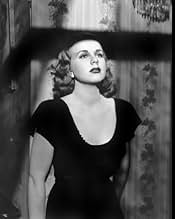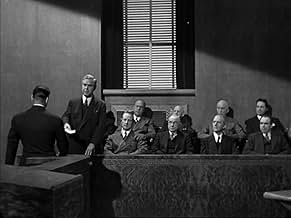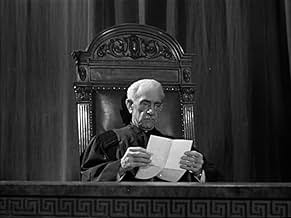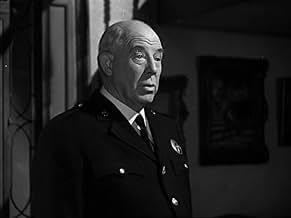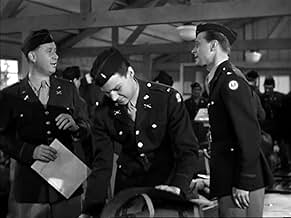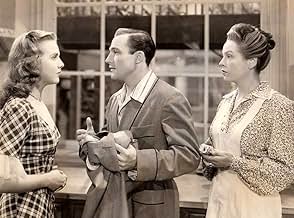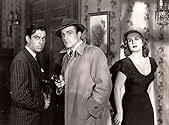IMDb-BEWERTUNG
6,5/10
1770
IHRE BEWERTUNG
Füge eine Handlung in deiner Sprache hinzuA young femme-fatale realizes that the man she married is an incorrigible wastrel.A young femme-fatale realizes that the man she married is an incorrigible wastrel.A young femme-fatale realizes that the man she married is an incorrigible wastrel.
- Regie
- Drehbuch
- Hauptbesetzung
- Für 1 Oscar nominiert
- 1 Nominierung insgesamt
Eddie Acuff
- Steve
- (Nicht genannt)
Fred Aldrich
- Bartender
- (Nicht genannt)
Frank Austin
- Jury Member
- (Nicht genannt)
John Barton
- Concertgoer
- (Nicht genannt)
Vangie Beilby
- Wedding Guest
- (Nicht genannt)
John Berkes
- Waiter
- (Nicht genannt)
Oliver Blake
- Defense Attorney
- (Nicht genannt)
Charles Cane
- Joe
- (Nicht genannt)
Wheaton Chambers
- Plane Passenger
- (Nicht genannt)
Ruth Cherrington
- Concertgoer
- (Nicht genannt)
James Conaty
- Concert Patron
- (Nicht genannt)
Empfohlene Bewertungen
I was lucky enough to catch a rare screening of this never-on-video film at the Cinematheque here in Hollywood last night. It was very beautiful, moving even, with lovely black-&-white cinematography by Woody Bredell. Other users' comments to the contrary, Gene Kelly's role is most definitely not insignificant - he's the villain, for crying out loud! His genuinely complex and subtle performance is a real standout in a film filled with wonderful work by all of the actors. Gale Sondergaard, also, is clearly well-cast, too, as Kelly's mother; she may have been a little young for the role in real life, but that certainly doesn't come across in her portrayal of the stifling, weak-willed, coddling mother of a killer. Deanna Durbin, though always more of a performer than an actor per se, is more than convincing as a world-weary singer in a whorehouse (not a night club; though it's never explicitly identified as a house of ill repute, only the most boneheaded viewer would take it for anything else). Her tearful breakdown in the church during Christmas Eve mass (an exquisitely rendered set piece, full of deep, soft shadows and luminous pools of communal light) is genuinely touching and heartfelt. And the film's final moments, if accepted unironically (as they were intended), are truly poetic and uplifting.
DEANNA DURBIN begged Universal to let her play a dramatic role after her great success in a string of mostly mediocre films where she played a Little-Miss-Fixit in featherweight romantic comedies who sang operatic ditties with great skill and charm. She was always involved in a scheme to reunite her mother and father for the final clinch.
Here, she handles her very adult role with competence, quite believable as a torch singer in a disreputable nightclub, a troubled woman seeking redemption for problems in her twisted past relationships with a mother and son (GALE SONDERGAARD and GENE KELLY).
Deanna shines in the role, giving it shades of both simplicity and charm while playing the happy bride, but convincing when she becomes the bruised and fragile woman who manages to tell her tale of woe to a young lieutenant. The soldier is nicely played by DEAN HARENS, an officer on Christmas leave who is on his way to San Francisco when a storm forces his plane to land in New Orleans.
The film structure is not always smooth, burdened as it is by a couple of flashbacks in the middle and a rather weak ending that is over too abruptly. But Robert Siodmak and cameraman Woody Bredell give the whole piece a fluid style with long tracking shots and superior cinematography for several key scenes, notably the one that takes place at a church service on Christmas eve, and another in a concert hall.
Durbin's fans will certainly appreciate her rendering of "Spring Will Be A Little Late This Year" and Irving Berlin's haunting ballad "Always." The background music, a mixture of popular songs and classical pieces, is effective, especially for all of the nightclub scenes. Hans J. Salter deservedly won an Oscar nomination for his detailed and meticulous score.
Effective supporting performances from GALE SONDERGAARD, GLADYS GEORGE and RICHARD WHORF strengthen the tale. Well worth watching. Oddly enough, Deanna handles her dramatic chores in much better style than Gene Kelly, who's unable to do much with his role of a weak-willed wastrel who turns to crime for reasons unexplained.
Trivia note: David Bruce has a small role at the beginning. Two years later he'd be co-starring with Deanna in much bigger parts in CAN'T HELP SINGING and LADY ON A TRAIN.
Here, she handles her very adult role with competence, quite believable as a torch singer in a disreputable nightclub, a troubled woman seeking redemption for problems in her twisted past relationships with a mother and son (GALE SONDERGAARD and GENE KELLY).
Deanna shines in the role, giving it shades of both simplicity and charm while playing the happy bride, but convincing when she becomes the bruised and fragile woman who manages to tell her tale of woe to a young lieutenant. The soldier is nicely played by DEAN HARENS, an officer on Christmas leave who is on his way to San Francisco when a storm forces his plane to land in New Orleans.
The film structure is not always smooth, burdened as it is by a couple of flashbacks in the middle and a rather weak ending that is over too abruptly. But Robert Siodmak and cameraman Woody Bredell give the whole piece a fluid style with long tracking shots and superior cinematography for several key scenes, notably the one that takes place at a church service on Christmas eve, and another in a concert hall.
Durbin's fans will certainly appreciate her rendering of "Spring Will Be A Little Late This Year" and Irving Berlin's haunting ballad "Always." The background music, a mixture of popular songs and classical pieces, is effective, especially for all of the nightclub scenes. Hans J. Salter deservedly won an Oscar nomination for his detailed and meticulous score.
Effective supporting performances from GALE SONDERGAARD, GLADYS GEORGE and RICHARD WHORF strengthen the tale. Well worth watching. Oddly enough, Deanna handles her dramatic chores in much better style than Gene Kelly, who's unable to do much with his role of a weak-willed wastrel who turns to crime for reasons unexplained.
Trivia note: David Bruce has a small role at the beginning. Two years later he'd be co-starring with Deanna in much bigger parts in CAN'T HELP SINGING and LADY ON A TRAIN.
Pairing sunny star Deanna Durbin with stormy director Robert Siodmak is like coupling Snow White with Orson Welles. So who's going to win out—Universal's top money earner or noir's artistic vision. It's a struggle between luminous halos, on one hand, and creepy shadows, on the other. Actually the odd pairing works pretty well, thanks to Durbin's genuine acting ability, Gene Kelly's subtle ambiguity, and an unusually suggestive script. Clearly, Durbin is looking to change her virginal type casting, while Kelly has yet (I believe) to settle into his premier dancing career.
But, it's really Kelly's Manette who steals the film, with both a startlingly sly performance and the script's unconventional suggestions of incest and homosexuality. For example, there's a rather emphatic reference to Manette's being his mother's "all", plus mom's (Sondergaard) consuming attachment throughout the film. There's also repeated reference to Manette's "weakness", just ambiguous enough to go beyond a gambling habit. Couple that with his shaded behavior in several scenes, especially in the "anything goes" gambling den. Needless to say, such forbidden themes could only be hinted at in 40's Hollywood.
Adding to the 40's exotica is Durbin playing what amounts to a barroom hooker. She may remain pure at heart—confirmed in the midnight mass scene—nonetheless, the role amounts to a risky departure for Universal's teen idol. Thus director Siodmak's challenge is to reaffirm Abigail's (Durbin) basic innocence no matter what else happens, which he does through selective cameo lighting, even though that conflicts with his noirish sensibility. Then too, Dean Haren's sweetly normal escort is there to reassure fans that underneath it all, Durbin remains Durbin.
And to think the studio entitled this odd excursion into the dark side, Christmas Holiday, of all things. I sympathize with unsuspecting fans plunking down money to see the usual Durbin fluff. Nevertheless, the movie remains a fascinating study in conflicting styles and ambiguous characterization.
But, it's really Kelly's Manette who steals the film, with both a startlingly sly performance and the script's unconventional suggestions of incest and homosexuality. For example, there's a rather emphatic reference to Manette's being his mother's "all", plus mom's (Sondergaard) consuming attachment throughout the film. There's also repeated reference to Manette's "weakness", just ambiguous enough to go beyond a gambling habit. Couple that with his shaded behavior in several scenes, especially in the "anything goes" gambling den. Needless to say, such forbidden themes could only be hinted at in 40's Hollywood.
Adding to the 40's exotica is Durbin playing what amounts to a barroom hooker. She may remain pure at heart—confirmed in the midnight mass scene—nonetheless, the role amounts to a risky departure for Universal's teen idol. Thus director Siodmak's challenge is to reaffirm Abigail's (Durbin) basic innocence no matter what else happens, which he does through selective cameo lighting, even though that conflicts with his noirish sensibility. Then too, Dean Haren's sweetly normal escort is there to reassure fans that underneath it all, Durbin remains Durbin.
And to think the studio entitled this odd excursion into the dark side, Christmas Holiday, of all things. I sympathize with unsuspecting fans plunking down money to see the usual Durbin fluff. Nevertheless, the movie remains a fascinating study in conflicting styles and ambiguous characterization.
A nice film--and it is nice to see Deanna Durbin shed her little girl image for something with a bit of a bite to it. She plays a singer in a nightclub and is married to Gene Kelly, although he doesn't have much to do in this film. Nice to see some good supporting performances by Gladys George and Gale Sondergaard--although Ms. Sondergaard seems a bit young to play Gene Kelly's mother!!
Hmmm, I wonder of Tennessee Williams saw this in 1945 and wrote SUDDENLY LAST SUMMER as a riff on this astonishing incestuous masochistic noir. Universal's 1944 "Christmas Holiday"is a startling dark film that is quite explicit in its adult themes of prostitution, self punishment, sexual manipulation, incest and some quite twisted emotional ideas. It even has scenes similar to that same 1959 Taylor Montgomery Hepburn drama. Cleverly, Universal cast music stars Gene Kelly as the handsome spoiled son with the demon mother (Gale Sondergaard) and cherubic Deanna Durbin as the adoring slavish young woman that Mother encourages he marries to keep his amoral unethical character in check. The idea that Mother enthusiastically endorses their marriage so she can control both of them by their sexual desire for each other is a rank idea as slimy as seen in the pre code shocker THE SILVER CORD. I personally found the film riveting and I very much liked the casting against type. For me it gave the film excellent surprise value. Kelly made a terrific seductive rat. Durbin's slide into willing prostitution to 'be with him' in a decadent lifestyle (while he was away) is a great downbeat storyline. Everything about "Christmas Holiday" is deceptive, right from the happy title to the handsome horror of Kelly's character. I will not spoil the story for you other than to say the whole film is a terrific ride, and with a ripe explicit tone, you will be seduced yourself. Plenty of flashback like SORRY WRONG NUMBER and equally as creepy. What a surprise! Hilariously, in Australia it was our Nationwide TV treat at 8.30pm on Christmas night! Haven't our TV programmers got a sly sense of humor.
Wusstest du schon
- WissenswertesBecause of the Hays Code, screenwriter Herman J. Mankiewicz changed the setting from a Paris brothel to a nightclub in New Orleans, and changed the main character from a prostitute to a more ambiguous nightclub singer and hostess, in adapting the 1939 novel of the same name by W. Somerset Maugham.
- PatzerAfter Robert breaks out of jail, the newspaper spells his last name as "Mannette". However, the correct spelling is "Manette".
- Zitate
Simon Fenimore: [to Charles] The planes are all grounded, the trains won't do you any good, and you're too big for me to carry on piggyback.
- VerbindungenReferenced in Go, Johnny, Go! (1959)
Top-Auswahl
Melde dich zum Bewerten an und greife auf die Watchlist für personalisierte Empfehlungen zu.
- How long is Christmas Holiday?Powered by Alexa
Details
- Erscheinungsdatum
- Herkunftsland
- Sprache
- Auch bekannt als
- Christmas Holiday
- Drehorte
- St Vibiana RC cathedral, Main St, Los Angeles, Kalifornien, USA(midnight mass scene)
- Produktionsfirma
- Weitere beteiligte Unternehmen bei IMDbPro anzeigen
- Laufzeit
- 1 Std. 33 Min.(93 min)
- Farbe
- Seitenverhältnis
- 1.37 : 1
Zu dieser Seite beitragen
Bearbeitung vorschlagen oder fehlenden Inhalt hinzufügen


